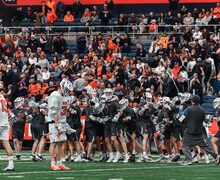College rankings give university mixed evaluation
Each year, high school seniors around the country look to the ranking of universities in college guide books to determine where they want to spend their next four years.
This year Syracuse University will be making an appearance in three of the top 10 lists, on the annual Princeton Review rating of the nation’s top college and universities, which could create both positive and negative results for the school.
SU ranked seventh out of the 357 colleges and universities surveyed by Forbes.com and the Princeton Review in the first-ever ranking of the most entrepreneurial campuses in the country. The university ranked eighth worst for race and class interaction, however, according to The Princeton Review, which surveyed 938 SU students who responded. All lists reflect student opinion only, without any input from The Princeton Review.
‘Rankings over the last 10 to 15 years have been steadily improving the depiction of the university’s stature,’ said David Smith, vice president of enrollment management at SU. ‘The entrepreneurship ranking is particularly pleasing because it says we prepare our students well for the real world.’
The university’s poor showing in race and class interaction, though, suggests the school still needs to do more.
‘We heard from students that there is great diversity, however, interaction could use some improvement,’ said Robert Francek, publisher and editor of The Princeton Review’s 375 Best Colleges and Universities. ‘There’s a difference between diversity and interaction of diverse groups of students.’
The entrepreneurial study, which is available only at Forbes.com, praised the Whitman School of Management’s Department of Entrepreneurship and Emerging Enterprises for assets such as prominent alumni and faculty, student organizations and mentorship programs. A track record of offering opportunities for students to intern or launch their own businesses was also a factor.
‘The ranking is a reinforcement of what we’ve been doing for years,’ said Michael Morris, chairman of the department. ‘We have a core commitment to the philosophy that every student is an entrepreneur.’
The department hopes to leverage the ranking to create awareness of the role that entrepreneurship plays, as well as to recruit top students, Morris said.
And this is a concern for the university when the poor rating in race and class interaction is taken into account, Smith said, although its effect on enrollment remains debatable. While there is no direct connection between ratings and enrollment numbers, the perception prospective students get are sometimes affected by their readings, he said.
The university is concerned for reasons well beyond the poor rating. The problem is a challenge for the whole SU community, Smith said. But Smith did not believe the ranking was cause for immediate reaction.
‘There is no cause to rally around this and start new programs,’ he said.
Many schools, most notably Duke University, have used the rankings to make positive changes on their campuses, Francek said. A year and a half ago, Duke was ranked as one of the colleges with least acceptance of homosexual lifestyles. The university responded with an awareness campaign and has since come off that list.
And some students favored this more active response to the negative rating.
‘I’m against programs that specifically force diversity, but I’m all for the administration creating an atmosphere where diversity and interaction can flourish,’ said Travis Mason, president of the African American Male Congress.
The future effects of The Princeton Review ranking may be questionable, but the lack of race and class interaction is not, Mason said.
‘People can see it and sense it. We don’t need statistics to know what’s going on,’ he said.
‘Steps need to be made to bridge these gaps.’
Published on October 27, 2004 at 12:00 pm





